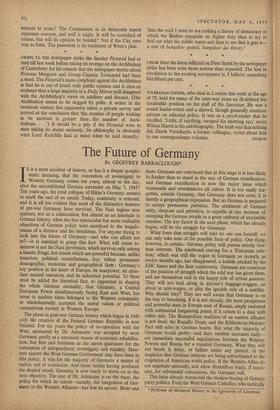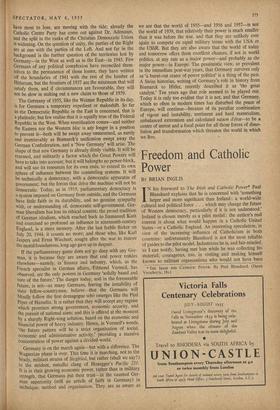The Future of Germany
IS it a mere accident of history, or has it a deeper sympto- matic meaning, that the restoration of sovereignty to Western Germany comes ten years, almost to the day, after the unconditional German surrender on May 7, 1945? Ten years ago, the total collapse of Hitler's Germany seemed to mark the end of an epoch. Today, continuity is restored. and it is all too evident that most of the distinctive features of pre-war Germany have survived. The Nazi regime now appears, not as a culmination, but almost as an interlude in German history, when the less spectacular but more realisable objectives of German policy were sacrificed to the megalo- mania of a dictator and his henchmen. For anyone trying to look into the future of Germany—and who can afford not to?—it is essential to grasp this fact. What will count to- morrow is not the Nazi perversion, which survives only among a lunatic fringe, but trends which are powerful because, unlike transitory political constellations, they reflect permanent demographic, economic and geographical facts : Germany's key position in the heart of Europe, its manpower, its abun- dant natural resources, and its industrial potential. To these must be added the historical fact, so important in shaping the whole German mentality, that Germany, a Central European Power simultaneously facing East and West, has never in modern times belonged to the Western community or wholeheartedly accepted the moral values or political assumptions current in Western Europe.
The phase in post-war German history which began in 1949 with the creation of the Federal German Republic is now finished. For six years the policy of co-operation with the West, sponsored by Dr. Adenauer, was accepted by most Germans, partly as a necessary means of economic rehabilita- tion, but first and foremost as the surest guarantee for the restoration of independence, sovereignty and equality. How- ever sincere the West German Government may have been in this policy, it was for the majority of Germans a matter of tactics, not of conviction. And those tactics having produced the desired result, Germany is now ready to move on to the next objective. The star of Dr. Adenauer is on the wane, the policy for which he stands—namely, the integration of Ger- many in the Western Alliance—has lost its savour. More and more Germans are convinced that at this stage it is less likely to further than to stand in the way of German reunification; and German reunification is now the major issue which transcends and overshadows all others. It is too easily for- gotten, outside Germany, that Germany does not exist; it is merely a geographical expression. But no German is prepared to accept permanent partition. The sentiment of German unity, deep-set and primitive, is capable at any moment of sweeping the German people in a great outburst of irresistible emotion. The key factor in the next phase, which has already begun, will be the struggle for Germany. have most to lose, are moving with the tide; already the Catholic Centre Party has come out against Dr. Adenauer, and the split in the ranks of the Christian Democratic Union is widening. On the question of unity, the parties of the Right are at one with the parties of the Left. And not far in the background is the further question of the territories lost by Germany—in the West as well as in the East—in 1945. Few Germans of any political complexion have reconciled them- selves to the permanence of these losses; they have written off the boundaries of 1941 with the rest of the lumber of Hitlerism, but the frontiers of. 1937 are the minimum that will satisfy them, and if circumstances are favourable, they will not be slow in staking out a new claim to those of 1939.
The Germany of 1955. like the Weimar Republic in its day, is for Germans a temporary expedient or makeshift. So far as the Democratic Republic in the East is concerned, that is a platitude; but few realise that it is equally true of the Federal Republic in the West. When reunification comes—and neither the Eastern nor the Western bloc is any longer in a position to prevent it—both will be swept away unmourned, as surely and irretrievably as Bismarck's unification swept away the German Confederation, and a 'New Germany' will arise. The shape of that new Germany is already dimly visible. It will be rearmed, and militarily a factor which the Great Powers will have to take into account; but it will belongto no power-block, and will use its resources for its own ends, to extend its own sphere of influence between the contending systems. It will be technically a democracy, with a democratic apparatus of government; but the forces that drive the machine will not be democratic. Today, as in 1919, parliamentary democracy is a system imposed on Germany from outside, and the Germans have little faith in its durability, and no genuine sympathy with, or understanding of, democratic self-government. Ger- man liberalism has lost its ethical content; the proud tradition of German idealism, which reached back to Immanuel Kant and exercised so profound an influence in nineteenth-century England, is a mere memory. After the last feeble flicker on July 20, 1944. it counts no more; and those who, like Karl Jaspers and Ernst Wiechert, sought after the war to restore the moral foundations, long ago gave up in despair. we are that the world of 1955—and 1956 and 1957—is not the world of 1939, that relatively their power is much smaller than it was before the war, and that they are unlikely ever again to compete on equal military terms with the USA or the USSR. But they are also aware that the world of today and tomorrow offers them excellent chances, if not in world politics, at any rate as a major power—and probably as the major power—in Europe. The pessimistic view, so prevalent in the immediate post-war years, that Germany survives only as 'a burnt-out crater of power politics' is a thing of the past. A Swiss historian, writing of Germany's role in history from Bismarck to Hitler, recently described it as 'the great catalyst.' Ten years ago that role seemed to be played out. Today it is only too evident that it is not, and that Germany, which so often in modern times has disturbed the peace of Europe, will continue—because of its peculiar combination of vigour and instability, sentiment and hard materialism, unbalanced extremism and calculated raison d'etat—to be a centre of unrest and a focal point for all those forces of disso- lution and transformation which threaten the world in which











































 Previous page
Previous page